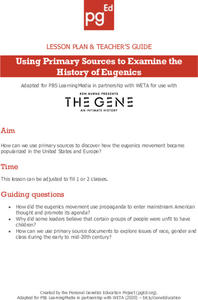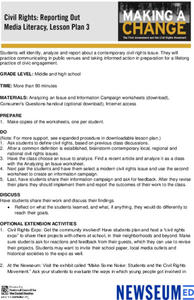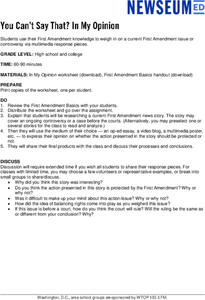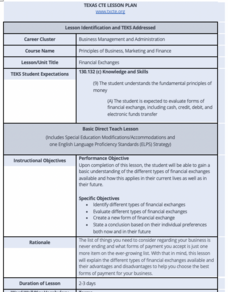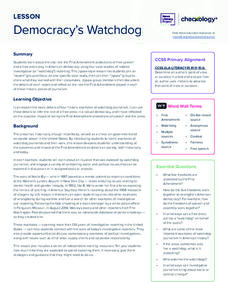Bonneville
Learning About Solar Updraft Towers
Give it up for updraft towers. Pupils learn about solar updraft towers by first watching a video. They then research these structures on their own and think about how the toys they made in the previous instructional activity use the same...
Bonneville
Informative Writing: Where Does Energy Come From?
Get energized about all the different sources of energy. A research project has scholars investigate a renewable or non-renewable energy type of their choice. They write a report on their findings and decide on a way to publish their work.
Personal Genetics Education Project
Using Primary Sources to Examine the History of Eugenics
Eugenics philosophy takes survival of the fittest to a whole new level. With a research-focused lesson, young scientists examine the history of the eugenics movement and its impact on society. Pupils engage with a video clip, primary...
Newseum
Civil Rights: Reporting Out
After brainstorming a list of contemporary local, regional, and national civil rights issues, pairs of scholars select one of these issues and design an information campaign to spread awareness of the issue.
Newseum
Search Signals: Understanding Your Top Hits
Class members watch a short video about the criteria used to drive search results to learn about how search engines work. Scholars use a "Search Signals" worksheet and a tip sheet to record information as they conduct a simple search of...
Newseum
Covering a Catastrophe: Evaluating Disaster News
Young journalists investigate the various ways to share news about a disaster and evaluate the pros and cons of each of these types of news. Individuals then select two different forms of media reports of a recent disaster. Using the...
Newseum
Journalists Code of Ethics
Journalists are supposed to adhere to a Code of Ethics. To determine the degree to which reporters follow this code, individuals select three recent stories with photographs from newspapers, magazines, online news sites, or television...
Newseum
Disinformation Nation: Separating Politics and Propaganda
Separating political rhetoric from propaganda is no small feat. Class members are challenged to examine two different sources about a candidate in an upcoming election and determine whether the primary purpose of the source is to inform...
Newseum
Civil Rights: Chronicling the Movement
Scholars investigate events in the civil rights era in their community and develop a multimedia presentation of their findings. They compare local events with national events discussed on a NewseumED timeline.
Newseum
Compare Coverage of Brown v. Board Ruling
Young journalists analyze how The Topeka State Journal, the Jackson Daily News, and The Providence Journal reported on the 1954 Supreme Court decision in Brown v Board of Education. Scholars scrutinize the headlines, photographs,...
Newseum
You Can’t Say That: In My Opinion
As a part of a study of the First Amendment, high schoolers research a current news story that seems to involve one of the freedoms granted by the First Amendment. Investigators decide whether they think the action presented in the story...
Newseum
Disinformation Nation: Is It Propaganda?
Propaganda or not? That is the question researchers must answer as they analyze techniques used in ads. Pupils use a three-part definition to determine if the ad is propaganda or advertising.
Newseum
Political Persuasion: It’s All About Image
Political candidates work hard at creating an image they believe will appeal to voters. High schoolers collect 10 photos and other images of a candidate and analyze them to determine what techniques create a positive or negative impression.
Newseum
Disinformation Nation: Checking Your Emotions
Propaganda is designed to manipulate! High schoolers learn how to recognize the devices propagandists use to evoke strong emotional reactions and practice techniques that help them avoid being manipulated.
Newseum
The Freedom to Make a Change
As part of a study of the First Amendment, young historians research instances when individuals or groups used the First Amendment to change the United State's laws or policies. Teams are each assigned a different case study. With the...
Newseum
Fake News Through History: Analyzing Historical Sources
Unfortunately, fake news, fuzzy facts, and bogus news stories are not new phenomena. Class members use a "Fake News Through History" worksheet to analyze historical examples of false, invented, made-up news. Researchers share their...
Newseum
Civil Rights: Identifying Community Issues
As part of the social, economic, and legal/political civil rights study, class members brainstorm a list of current civil rights issues that affect their community. Individuals or pairs select one issue to research further. The class...
Texas Education Agency (TEA)
Legal Responsibilities of Financial Exchanges
Let's stock up on knowledge! With lecture and discussion, pupils explore the legal responsibilities of monetary exchange. Scholars then research laws about financial exchange in the stock market and create a poster to illustrate their...
Texas Education Agency (TEA)
Financial Exchanges
It's time to cash in some chips and learn about financial literacy. Using the informative resource, scholars identify and evaluate different types of financial exchanges. Pupils then develop a new form of financial exchange and create a...
News Literacy Project
News Goggles: Conflicts of Interest in News Reports
Nineteen slides use the story of Chris Cuomo of CNN and his refusal to discuss his brother, New York governor Andrew's political troubles, to inform viewers about the idea of conflict of interest in journalism.
News Literacy Project
Democracy’s Watchdog
As part of a study of the importance of the First Amendment, expert groups research different historic case studies of investigative reporting, and then the experts share their findings with jigsaw groups. The case studies include Nellie...
News Literacy Project
Fact-Check It!
Here's a lesson designed to help learners develop their digital verification skills. First, expert groups study specific digital verification skills, and in a jigsaw activity, share what they have learned with classmates. The jigsaw...
News Literacy Project
News Goggles: Lionel Ramos, Oklahoma Watch
Given all the recent criticism of the news media and coverage, it's crucial that young people are given the tools they need to evaluate what they see, hear, and read about current events. A video interview from "News Goggles" introduces...
Simon & Schuster
Classroom Activities for The Call of the Wild by Jack London
Three activities are designed for readers of Jack London's The Call of the Wild. First, class members research and create posters that reflect the setting of the novel. Next, groups create posters with images that represent each chapter...




